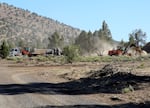
The Hon. Raymond D. Crutchley, a judge for the 11th Judicial District Circuit Court of Oregon, listens as evidence is presented in a bench trial over water rights for the Thornburgh resort in Central Oregon, Nov. 7, 2024.
Emily Cureton Cook / OPB
A Deschutes County Circuit Court judge recently dealt a blow to plans for the much-contested Thornburgh resort in Central Oregon.
In a March 31 opinion, Judge Raymond Crutchley shot down a petition brought by the developer against state regulators over access to groundwater in the Deschutes Basin.
The case went to trial last year. Thornburgh developer Kameron DeLashmutt sought state approval to pump well water for construction at the nearly 2,000-acre resort site near Redmond. The plans include 950 single-family homes, a golf course, private lakes and a luxury hotel.
DeLashmutt challenged the Oregon Department of Water Resources in court after it denied a water use license, which is just one bid for water among a complicated mosaic of state applications.
Citing long-term groundwater declines in the area, state officials found Thornburgh’s proposed water use for construction would likely not be “within the capacity of the resource.”
That technical term — “capacity of the resource” — has lately gone from being esoteric jargon in state agency paperwork to shorthand for a broader debate about the future of water and development in Central Oregon.
Crutchley’s opinion calls OWRD’s use of the term “rational, fair, and principled” as it justified the denial of Thornburgh’s application for construction water.
Conservation group WaterWatch cheered the judge’s decision in a press release, calling it “great news” for fish and wildlife. The nonprofit voluntarily joined with state attorneys to fend off DeLashmutt’s legal challenge, in part because it hopes for ripple effects.
“We expect that the agency will apply this same approach in other basins that have serious groundwater decline issues,” WaterWatch attorney Karl Anuta said in a statement.
State experts pointed to water levels in monitored wells near the Thornburgh site dropping year after year since the mid-1990s. Crutchley agreed with the agency that “those declines are not expected to improve soon,” largely because of climate change.

Thornburgh developer Kameron DeLashmutt listens to testimony about the capacity of the Deschutes Basin aquifer while seated behind his water law attorney, Elizabeth Howard, in Deschutes County Circuit Court on Nov. 7, 2024.
Emily Cureton Cook / OPB
DeLashmutt said in an email that “the decision overlooked key and critical facts.”
“The most salient of these is the sheer magnitude of the aquifer itself,” he said.
The developer’s latest legal battle against the state included showdowns between expert witnesses who offered dueling outlooks about water availability in a region where housing is in high demand, and cities like Redmond have bemoaned the state’s more conservative approach to issuing groundwater rights.
“I think OWRD is wrong,” Redmond Mayor Ed Fitch said. “We do have capacity — It’s how we use that capacity. In my mind, that’s the critical issue.”
Fitch serves as the chair of the Central Oregon Cities Organization, with advocates for the cities of Bend, Culver, Madras, Redmond, La Pine, Maupin, Metolius, Prineville and Sisters.
The outcome of the latest Thornburgh case, he added, “underlies the need for policy changes and changes in the law.”
“Cities need to have assurance that they will have access to water in the future. But on the other hand, cities are going to have to exercise a substantially higher level of water conservation,” Fitch said.

A map shows the footprint of the nearly 2,000 acre Thornburgh resort site in relation to Redmond, Oregon.
MacGregor Campbell / OPB
The cost of Thornburgh’s legal battle caught the attention of Democratic state Rep. Emerson Levy for different reasons. Her district includes north Bend, south Redmond, Tumalo, Sisters, Eagle Crest and Black Butte.
“It’s important to have process, for all sides to be heard when building big contentious projects that have impacts on our water systems, but we need to look at how we’ve created an appeals system that is costly and inefficient,” Levy said in a text message.
Over the last three years, OWRD has racked up $732,842 in legal fees related to the Thornburgh resort site, according to agency spokesperson Alyssa Rash.
Some 57% of that total comes from protests and petitions filed by the developer to overturn state decisions. The other 43% stemmed from protests filed by opponents of the resort challenging state decisions.

In this 2022 file photo, heavy equipment operators work at the Thornburgh resort site in Central Oregon's Deschutes County.
Emily Cureton Cook / OPB
DeLashmutt has been trying to permit and finance Thornburgh since the early 2000s. Once his grandparents’ rangeland, the site has become a more than $37 million investment for private equity firm Sortis Holdings.
Despite the recent setback in court, DeLashmutt said, “Thornburgh has water rights and approved transfers that provide water for our Phase A development plans.”
One key state application that would allow the built-out resort to permanently pump groundwater remains tied up in a separate legal proceeding.
Back in 2013, state regulators initially agreed Thornburgh would be allowed to pump groundwater. That authorization lapsed before DeLashmutt actually built wells, opening the door for the state to deny an extension. The case will get an administrative court hearing “in the near future,” according to OWRD.
In the meantime, OWRD Deputy Director Doug Woodcock said in a statement that Thornburgh’s utility company, Pinnacle, “cannot use water” under that permit, “and we advise them not to.”





